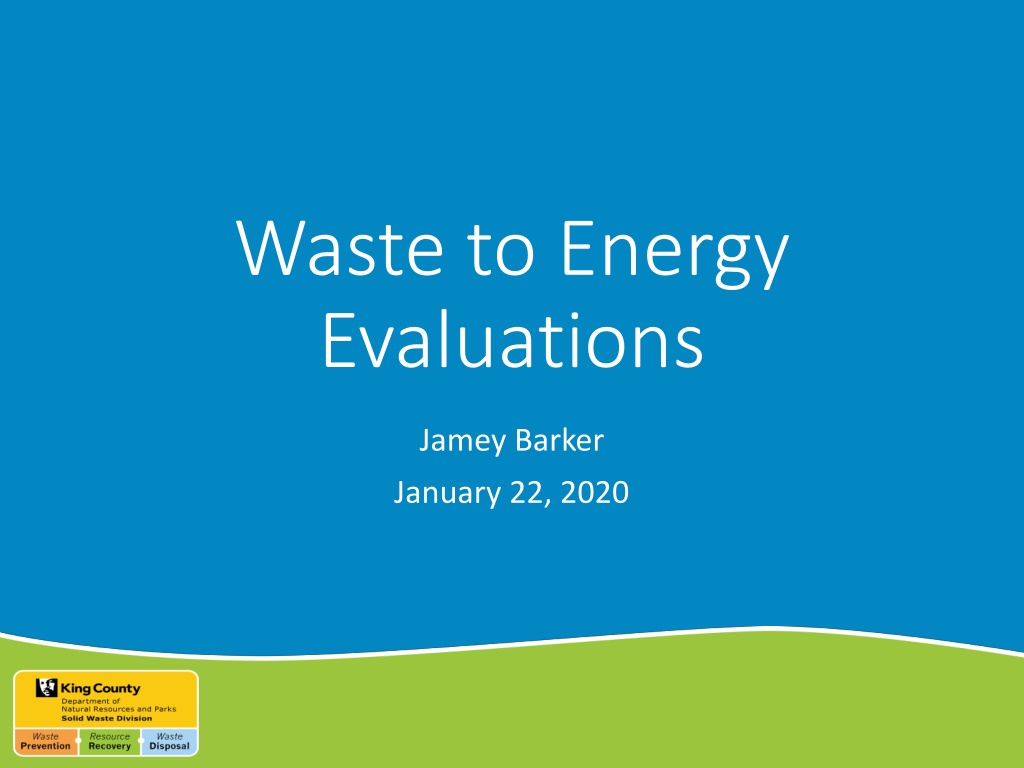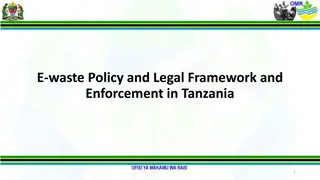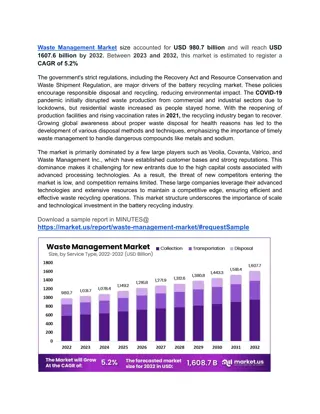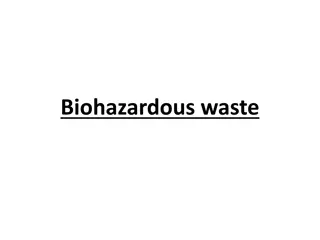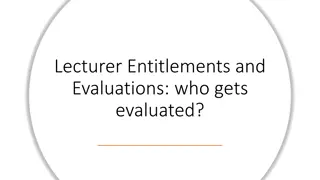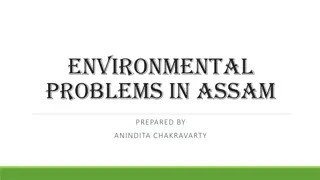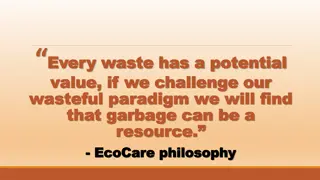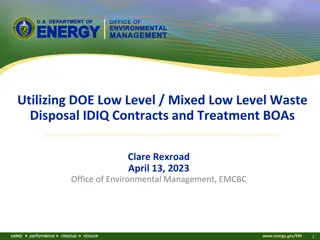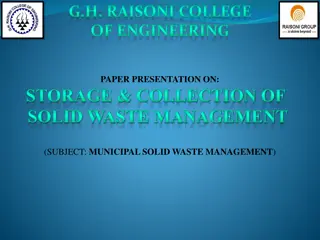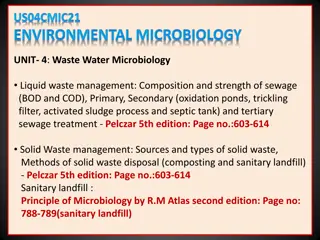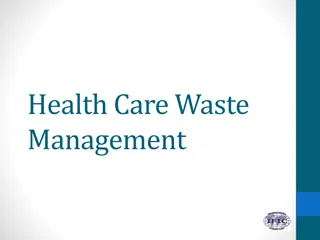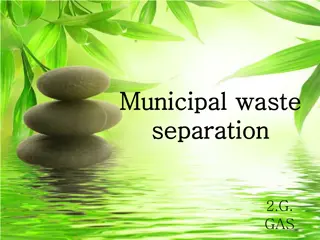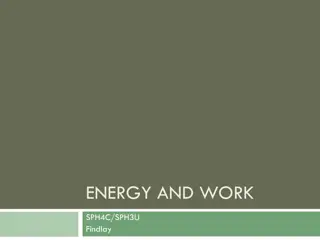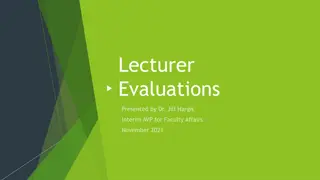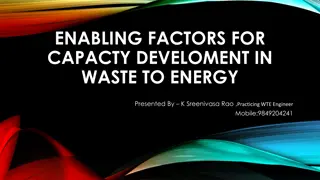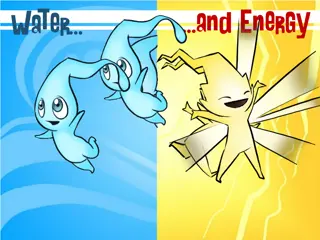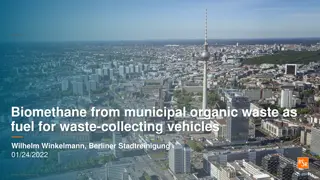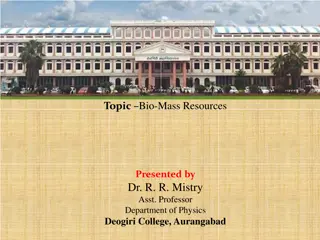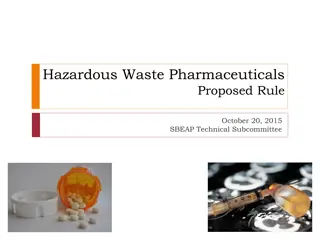King County Waste to Energy Evaluations - A Comprehensive Review
King County has conducted in-depth evaluations on waste to energy technologies over 40 years, focusing on evolving waste management techniques and financial considerations. The analysis includes background assumptions, financial aspects, challenges posed by new state laws, and a comparative assessment for future development options.
Download Presentation

Please find below an Image/Link to download the presentation.
The content on the website is provided AS IS for your information and personal use only. It may not be sold, licensed, or shared on other websites without obtaining consent from the author. Download presentation by click this link. If you encounter any issues during the download, it is possible that the publisher has removed the file from their server.
E N D
Presentation Transcript
Waste to Energy Evaluations Jamey Barker January 22, 2020
King County Has Studied Evolving Waste Technologies for 40 years. 1980s 2008 Energy Recovery Program 2017 Alternative Disposal Technologies 2018 Advanced Material Recovery & Waste To Energy (SWD) 2019 Waste To Energy (Normandeau) Waste To Energy vs. Waste Export by Rail (ARCADIS)
Background Assumptions King County will reach zero waste of resources. Recycling lowers disposal costs and increases carbon offsets. WTE technology would be MSW mass burn. WTE doesn t produce recognizable renewable energy. 4,000 TPD of disposal capacity for the next 20 yrs. EPA s WARM model is the tool for evaluating GHG
WTE Financials Initial capital costs estimated at $1.4 B - $1.8B Additional capital costs required for future expansion (10-15 yrs.) Energy sales offset costs, however; Difficult to forecast Future value depends of Clean Energy Transformation Act Washington power pricing is relatively low
New State Laws Increase Challenges/Costs for WTE By 2030 utility generation will need to be carbon neutral By 2045 utility generation will be non-emitting Technology to make WTE non-emitting has not been proven feasible at this scale Energy revenue offsets approximately $30M/year for a 4,000 TPD plant.
For King County, Further Development of Cedar Hills Was the Right Choice for 2028 COMPARATIVE COMPARATIVE ATTRIBUTE ATTRIBUTE FURTHER DEVELOP FURTHER DEVELOP CEDAR HILLS CAPACITY CEDAR HILLS CAPACITY EXPORT TO EXPORT TO OUT COUNTY LANDFILL COUNTY LANDFILL OUT- -OF OF- - WASTE WASTE- -TO TO- -ENERGY ENERGY FACILITY FACILITY Cost per Ton (2029$) Cost per Ton (2029$) $41 $55 $136 12,000 to 80,000 MTCO2e 1,200,000 MTCO2e/year (131,000) MTCO2e 95,000 MTCO2e/year (77,000) MTCO2e 95,000 MTCO2e/year Life Cycle Greenhouse Life Cycle Greenhouse Gas Emissions Gas Emissions (EPA s WARM Model) Annual Greenhouse Gas Annual Greenhouse Gas Emissions Emissions (EPA s (EPA s eGGRT (EPA s WARM Model) eGGRT) ) Recycling Rate Recycling Rate No Change No Change 2% Increase Risks Risks SEPA, Permitting Rail Capacity, Control Siting, Sizing
Waste composition is extremely important when evaluating the impact of any disposal technology. Title Title Waste To Energy GHG Emissions 100,000 80,000 Bullet 80,000 Points 60,000 40,000 MTCO2e 20,000 - (20,000) (40,000) (50,000) (60,000) King County Waste Composition National Average Mixed MSW
Siting & Permitting Pose Difficult to Quantify Risks Site requirements estimated at 40-55 acres Political acceptance and future regulations are two difficult-to-quantify risks". (ARCADIS 2019) WTE permitting schedule is based upon the assumption that there are no significant regulatory hurdles or public opposition to the project . (ARCADIS 2019) History of 1980s siting in Renton
WTE Doesn't Eliminate Landfilling Conservative estimates are that 7% of the ash could be in demand by local markets. The remainder would be landfilled in a monofil cell. Cedar Hills does not have a space designated for a monofil. Out of county export of residual ash would be required.
Key Take Away Messages Any alternative to Cedar Hills will be more expensive. WTE is not off the table we are more informed and will continue to keep an eye on evolving technology. We are not limited to either Landfilling or WTE. There are many other alternatives that should be considered as part of the solution. We will collaborate across traditional boundaries to discover and desing our regional resource and waste management system. (ZWORP) By 2025, we will upate our regional Comp Plan to guide our strategies to zero waste.
Questions? Questions?
King Street Center 201 South Jackson Street, Suite 701 Seattle, WA 98104-3855 206-477-4466 711 TTY Relay your.kingcounty.gov/solidwaste
